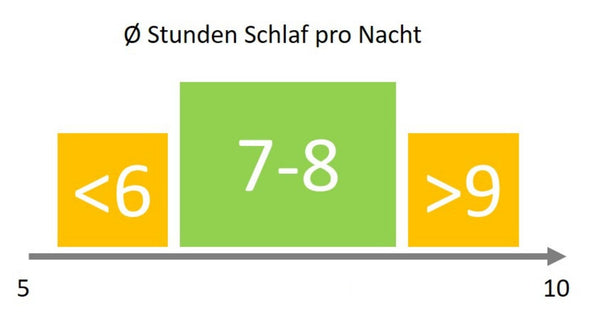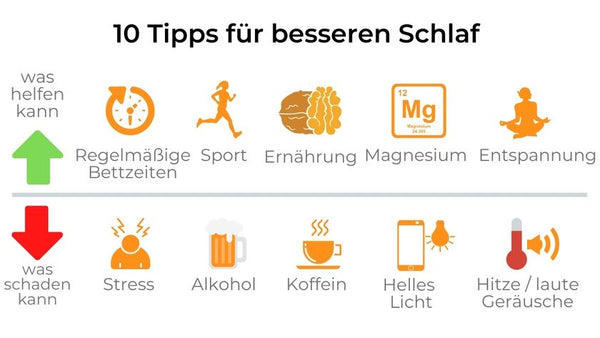Do you feel fit and alert when you get up and are you most productive in the morning? Or would you like to lie down again and tend to be most active in the afternoon/evening?
If the latter is more the case, you are like me and you would be called a "night owl" or affectionately "morning grouch".
California sleep researchers found out in a study with almost 90,000 participants that this is largely genetic, but can change over the course of life. Just over 56% of subjects would classify themselves as evening people, the younger the more likely. The proportion of morning people in the age group under 30 is only 24.2%, while among the over 60 year olds more than 63.1% would describe themselves as "early birds". (1)
If you belong to the group of "Night Owls", this is not only the perfect excuse for morning upsets, but you should also try (as far as possible) to live according to your natural sleep-wake rhythm and it as little shift or suppress as possible. Accordingly, not only the number of hours is an important factor, but also when you sleep - in relation to your individual biorhythm.
But before we discuss the optimal length of sleep, it's important to understand:
Why are we sleeping?
Have you ever wondered why we sleep at all?
Sure - sleep is generally used for mental and physical recovery. The capacity of the brain is fully utilized after about 16 hours and the nerve cells have to recover. Important memory processes also take place during sleep. Here are just a few more important reasons why sleep is so essential for us (2)(3)(4):

In summary: sleep is extremely important for mental and physical performance.
But how many hours are considered "optimal"? 6? 7? or even 10 hours? Spoiler alert: More isn't always better.
First of all, it must be said that the need for sleep is very individual and depends on various factors, for example:
-
Age (kids need more than adults)
-
Genetics
-
Sex
-
Life situation
and many more. A complete list and explanation of the connections could fill a separate blog post.
Despite all individual factors and differences, several studies suggest that the optimal amount of sleep for most healthy adults averages between 7 and 7.5 hours per night . (4)(5)(6)

In this case, optimal means that the majority of people feel rested and active with this sleep duration. In addition, the positive effects outweigh the negative ones Consequences are as small as possible.
For example, with an average sleep duration of less than six hours, the risk of type 2 diabetes, cardiovascular diseases, disorders of the immune system and mood swings increases, among other things. In addition, physical and mental performance decreases dramatically and one tends to eat more calories to take. (7)
However, too much of a good thing is also not recommended. With a longer average sleep duration (some studies speak of more than 8.5-10 hours here), the negative effects can predominate. An increased tendency to depression and sleep apnea was observed in people who regularly sleep more than 8.5 hours (5).
Whether this is caused by the longer sleep or whether the longer sleep is brought about by these factors is controversial. However, there are indications that sleep efficiency (=percentage ratio of sleep duration to bed time)decreases with longer sleep durations. (8)
Since sleep duration is an important, but not the only factor for good sleep, let's take a closer look at sleep quality and answer the question:
What can I do to improve my sleep?
A good sleep quality means that you feel well rested in the morning, that you have had enough deep sleep to regenerate your body and mind and that you have been able to process the day's events well. We have put together our 10 tips for better sleep to optimize your sleep quality:

First things first: Make sleep a priority in your daily life.
Sounds a bit unusual, but giving enough time in everyday life to sleep, including the evening and morning routine, helps significantly to improve the quality of sleep.
It is particularly important to create a "routine" here, i.e. going to bed and waking up at the same time if possible. I have bad news for everyone who gets too little sleep during the week due to a busy schedule and sleeps longer at the weekend: This does not seem to be a suitable countermeasure to compensate for the metabolic disorders caused by the lack of sleep. (9)
It is therefore important to get enough sleep every day if possible. Another important topic is reducing stress. Be it through sport in general (however not too close to bedtime), meditation, yoga or other relaxation techniques. A low level of the stress hormone cortisol ensures better sleep.
Exercise during the day or a light exercise session before going to bed (e.g. a few stretching and flexibility exercises) help wonderfully to increase the quality of sleep.
Our nutrition also has an influence on sleep. You may have heard or read that eating heavy foods (foods high in fat and/or sugar) is not the best idea before bed. Our body is then busy digesting instead of regenerating.(10)
However, there are also foods that can have a positive effect on the quality of sleep, for example
-
Nuts,
-
Leaf greens like spinach,
-
bananas,
-
Beans
-
Whole grains and dairy products
due to its high content of magnesium and B vitamins. (11)
Since magnesium not only plays an important role in the body in relation to sleep but also supports other essential processes, supplementation with high-quality magnesium (especially the one in our Sweet Dreams contained magnesium bisglycinate should be mentioned here in connection with increased sleep quality) make sense (after consulting a doctor or nutritionist).
You can
also lead to a more restful sleep
-
eggs,
-
Tofu,
-
Nuts (especially walnuts),
-
Dairy products and whole grains
contribute because they contain large amounts of the amino acid tryptophan (used in the production of the sleep hormone melatonin). (12)
A few simple recipe ideas for the evening are, for example, a small low-fat curd cheese or Greek yoghurt with banana, chia seeds and oatmeal (optionally nuts) or a small portion of wholemeal or lentil pasta with egg, broccoli and almonds.
The situation is different with alcohol and caffeine. Alcohol should generally be avoided as a sleep aid, as it impairs the quality of sleep. (13)
The caffeine contained in energy drinks, coffee, black and green tea, among other things, should also be avoided a few hours before going to bed due to its stimulating effect. Even if consumed six hours before bedtime, caffeine can have a negative effect and lead to a shallower sleep. (14)
Another essential factor is a pleasant sleeping climate. If it is too hot in the bedroom or if the duvet is too warm, the body cannot lower its temperature and falling asleep can be more difficult. Also, loud noises can not only prevent you from falling asleep, but also significantly affect the quality of sleep. A temperature between 16 and 18 degrees Celsius is considered optimal.
And now, finally, bad news for all those who look at their smartphone for a long time shortly before falling asleep or answer e-mails on the computer late in the evening: Bright light or light with a high blue component can be too lead to problems falling asleep and disturb sleep, as it inhibits the production of the sleep hormone melatonin. (15)
It is better not to use the smartphone or other screen devices for at least 1-2 hours before falling asleep. Instead, you can read a book, do stretching and flexibility exercises, or chat with your partner.
With these tips, nothing should stand in the way of your well-deserved bed rest.
If you liked this blog post, we would be happy if you share it. If you have any questions, please send them to us via the contact form or by direct message on Instagram or Facebook. We rejoice!
References:
(1) Hu, Y., Shmygelska, A., Tran, D.et al.GWAS of 89,283 individuals identifies genetic variants associated with self-reporting of being a morning person.Nat Commun7,10448 (2016). https://doi.org/10.1038/ncomms10448 | https://www.nature.com/articles/ncomms10448#citeas
(3) Ben Simon, E., Rossi, A., Harvey, A.G.et al.Overanxious and underslept .Nat Hum Behav 4, 100-110 (2020). https://doi.org/10.1038/s41562-019-0754-8
(5) Kripke DF, Garfinkel L, Wingard DL, Klauber MR, Marler MR. Mortality Associated With Sleep Duration and Insomnia.Arch Gen Psychiatry.2002;59(2):131–136. doi:10.1001/archpsyc.59.2.131 | https://jamanetwork.com/journals/jamapsychiatry/fullarticle/206050?resultClick=1
(7) Nedeltcheva et al. “Insufficient sleep undermines dietary efforts to reduce
adiposity” (2010)
(9) Christopher M Depner, Edward L Melanson, Robert H Eckel, Janet K Snell-Bergeon, Leigh Perreault, Bryan C Bergman, Janine A Higgins, Molly K Guerin, Ellen R Stothard, Sarah J Morton, Kenneth P Wright. Ad libitum Weekend Recovery Sleep Fails to Prevent Metabolic Dysregulation during a Repeating Pattern of Insufficient Sleep and Weekend Recovery Sleep, Current Biology, (2019)
(14) Drake C, et al.Caffeine effects on sleep taken 0, 3, or 6 hours before going to bed.J Clin Sleep Med. (2013)
(15) Bedrosian TA, Nelson RJ.Timing of light exposure affects mood and brain circuits.Transl Psychiatry. (2017)
Important note: We research our blog posts with the utmost care to help you live your life with the best quality of life. However, they do not replace advice from medically trained staff in the event of health problems.If you have problems sleeping, please contact your trusted doctor
